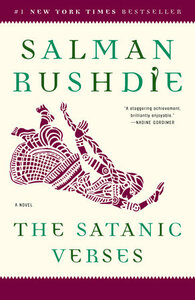Take a photo of a barcode or cover
When The Satanic Verses by Salmon Rushdie was first published, I was afraid to read it because of the title. I remember there was a big uproar among Muslims in the Middle East and the Ayatollah Khomeini was so enraged, he issues a fatwa (it’s basically a go-kill) on Rushdie. At the time, there was a scare going on in this country about witchcraft and Satanism. I stuck to reading other books instead.
Then recently, at a speaking engagement, Rushdie was attacked and stabbed. The fatwa issued in the 1980s hadn’t been cancelled and after almost 40 years, a would-be assassin acted on it. Fortunately, Rushdie survived the attack. Now my curiosity was piqued. What was so offensive in the book to cause the fatwa?
It took a long time to read the book, longer than even a Diana Gabaldon novel. I was in a constant state of “what’s going on here?” as I struggled through most of the book. It was like reading a book written by someone who was tripping.
There are two main characters, but there are a host of others. Both characters are Muslims born in India but living in England. Gibreel Farishta is a well-known actor in Indian films. Saladin Chamcha is an ex-pat from India, working as a voice actor. There is a long list of other characters who’d appear and disappear throughout the story. It begins with both characters on a hijacked plane. The hijackers blow the plane up, and Gibreel and Saladin fall to the earth together, landing in England.
When Saladin was featured more in a section, I had no trouble understanding. He was brought up by a father who was rather harsh. He and his father had a major disagreement and Saladin left India, shortening his given name. When Gibreel was featured, I was clueless as to what was going on. Later I realized that Gibreel had mental health issues and those sections were filled with dreams and delusions.
It was at those points I was thinking “huh? Is this really happening? Why is this part in the book?” Part of the book revolves around a Mohammed character called Mahoun. It was this section that gave the most offense and I understand why but I didn’t think it warranted a fatwa. I thought the story mostly focused on being different and being alone.
I was tempted to set the book aside many times but it was a challenge I wanted to meet. It was like working with a jigsaw puzzle and took a long time to get enough pieces of it together to understand how it was all going to go together. So, it’s a good read if you have a lot of time to spare.
Then recently, at a speaking engagement, Rushdie was attacked and stabbed. The fatwa issued in the 1980s hadn’t been cancelled and after almost 40 years, a would-be assassin acted on it. Fortunately, Rushdie survived the attack. Now my curiosity was piqued. What was so offensive in the book to cause the fatwa?
It took a long time to read the book, longer than even a Diana Gabaldon novel. I was in a constant state of “what’s going on here?” as I struggled through most of the book. It was like reading a book written by someone who was tripping.
There are two main characters, but there are a host of others. Both characters are Muslims born in India but living in England. Gibreel Farishta is a well-known actor in Indian films. Saladin Chamcha is an ex-pat from India, working as a voice actor. There is a long list of other characters who’d appear and disappear throughout the story. It begins with both characters on a hijacked plane. The hijackers blow the plane up, and Gibreel and Saladin fall to the earth together, landing in England.
When Saladin was featured more in a section, I had no trouble understanding. He was brought up by a father who was rather harsh. He and his father had a major disagreement and Saladin left India, shortening his given name. When Gibreel was featured, I was clueless as to what was going on. Later I realized that Gibreel had mental health issues and those sections were filled with dreams and delusions.
It was at those points I was thinking “huh? Is this really happening? Why is this part in the book?” Part of the book revolves around a Mohammed character called Mahoun. It was this section that gave the most offense and I understand why but I didn’t think it warranted a fatwa. I thought the story mostly focused on being different and being alone.
I was tempted to set the book aside many times but it was a challenge I wanted to meet. It was like working with a jigsaw puzzle and took a long time to get enough pieces of it together to understand how it was all going to go together. So, it’s a good read if you have a lot of time to spare.
I had never read Rushdie before, and when I saw this available through my library’s overdrive I decided to pick it up.
Pros: I really loved his writing style. It is dense, and took me a little while to get into, but when I did I found it really enjoyable. Some authors slow down the pace when they get florid, but I found Rushdie really kept me reading and engaged, using language to speed the plot. I loved the magical realism elements (the old woman bringing her past back to life, while a total non-sequiter, is full of images that will stick with me.) And I actually enjoyed the cast of thousands, though this is a book that rewards people who can sit and read for long chunks of time, it can be hard to pop in and out and still keep track of who’s who.
Cons: Good lord this book is long. And as much as I enjoyed the florid prose and many characters, there were a lot of repeated story beats that I think could have been excised without impacting the story a bit. Characters had the same revelation multiple times, people have the same conversation… I think the story would have been stronger (and maybe 50 pages shorter) if he’d been a little more strategic with editing.
Pros: I really loved his writing style. It is dense, and took me a little while to get into, but when I did I found it really enjoyable. Some authors slow down the pace when they get florid, but I found Rushdie really kept me reading and engaged, using language to speed the plot. I loved the magical realism elements (the old woman bringing her past back to life, while a total non-sequiter, is full of images that will stick with me.) And I actually enjoyed the cast of thousands, though this is a book that rewards people who can sit and read for long chunks of time, it can be hard to pop in and out and still keep track of who’s who.
Cons: Good lord this book is long. And as much as I enjoyed the florid prose and many characters, there were a lot of repeated story beats that I think could have been excised without impacting the story a bit. Characters had the same revelation multiple times, people have the same conversation… I think the story would have been stronger (and maybe 50 pages shorter) if he’d been a little more strategic with editing.
Seriously, a first rate top hat masterpiece of a book, thrumdunctious magical realism meets some biting social commentary, and sharp religious play. To cut it short, like an Owl who's mastered calculus, Rushie is a genius for this work, and those who campaigned against this work and him are, to steal from Blackadder, wronger than wrong Jack McWrong, winner of the annual Mr Wong Competition.
Interesting. Complicated. Often I felt disoriented and wasn't sure what was happening, but I read quickly and hoped the important themes and characters would stand out. Some parts were so tender and beautiful, or so devastating and brutal, or wickedly funny...it's clearly very good writing. I started this book soon after Rushdie was violently attacked. I hope he thrives and continues living and writing.
challenging
medium-paced
Plot or Character Driven:
Character
Strong character development:
Complicated
Loveable characters:
No
Diverse cast of characters:
Yes
Flaws of characters a main focus:
Yes
It had a rough start, but I really ended up loving it. it had some profound messages about love, being human, how it feels to be an immigrant, and the importance of mental health. Rushdie's writing style was really beautiful.
I just can't with this, got about 2/3 in but it's just too random and crazy and ridiculous.
Added this to my list to understand how Rushdie offended the Shah and was on a hit list. The best way I can think to describe this book is a kaleidescope of stories involving religion, culture, love and self-knowledge. Everything merged and diverged and some characters crossed stories. The language contributed to this, having things phonetically spelled with various accents. I'm glad I read it for the singular experience it provided, but don't think I can say I enjoyed it.
I really need to stop reading books with magical realism when I know I don't like that style... This is on me. I think this book was objectively well-written and it had themes/messages that I found really powerful and relevant. I love the investigation of religion and morality, agency and fate, colonialism, sexism, etc. However, I did not really enjoy reading it.
This is the third Rushdie book I've read, and probably the one I was able to understand the most. My brain revolts at the beginning of magical realist novels because it is asked to do so much work to understand the narrative beneath the crazy, sporadic words. It just seems like the fanciness (dare I say pretentiousness?) detracts from the ability to voice truth and develop beloved characters. In the Satanic Verses, this was mainly a problem in the first third of the novel, but it got much more coherent as it went on.
This is the third Rushdie book I've read, and probably the one I was able to understand the most. My brain revolts at the beginning of magical realist novels because it is asked to do so much work to understand the narrative beneath the crazy, sporadic words. It just seems like the fanciness (dare I say pretentiousness?) detracts from the ability to voice truth and develop beloved characters. In the Satanic Verses, this was mainly a problem in the first third of the novel, but it got much more coherent as it went on.
This book was not at all what I expected. It was funny. It was intriguing. It didn't stick with me the way I expected it to--but I love it.



